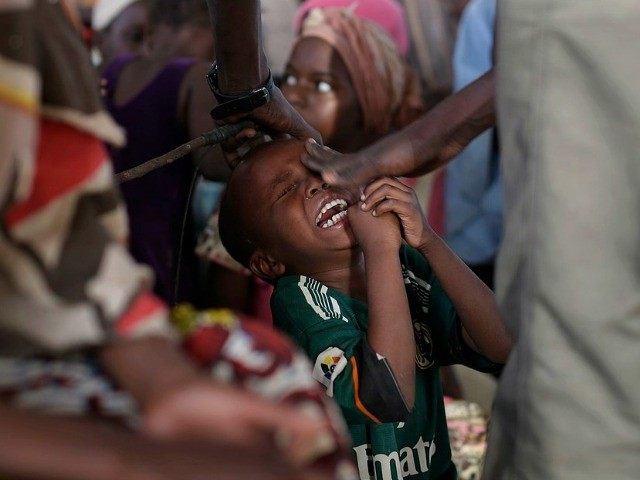Muslim children living in Chad after fleeing the rampant violence in their native Central African Republic are forced, in one refugee camp, to learn the Quran at the crack of a whip, facing lashes for violations varying from mistakes in recital of the Quran to simply not reciting the words loudly enough.
In an extensive report, the Associated Press highlights one madrassa in particular that serves refugee children near the Chadian capital, N’Djamena; some of these children are as young as three. Their parents are aware of the way the classes are taught and the physical violence to which their children are exposed. They choose to send them there anyway because it is an indoor building with shelter from the Saharan sun and one of the few chances the children will have of receiving any sort of education.
The class an Associated Press reporter attended contained about 30 children, both boys and girls, forced to recite Quranic verses verbatim, while the teacher, a teenager himself, walked around the classroom with a whip. The Daily Mail notes one incident where a child was whipped accidentally and hurt in the eye, for sitting next to a girl who was not reciting loudly enough. It was the one instance of sympathy from the teacher described in the report.
The madrassa, the report continues, is “unofficial,” and there is a “regular” school in another part of the camp. That school is not in a building, however, but in a tent, and parents have opted for religious education for that reason, as well as their religious background. Most refugees fleeing to Chad from the Central African Republic are Muslims.
An estimated 5,000 CAR refugees are living in the camp near the Chadian capital.
Sectarian violence has made life in CAR nearly impossible for Muslim and Christian populations alike, their fate determined by how strongly the pendulum of power swings in the direction of either religious group. As International Crisis Group explains, a coup in March 2013 triggered the latest round of flight from CAR, and in November 2014, it was estimated that 240,000 people had left the country for Cameroon and Chad.
While the refugees and Chadian natives are both mostly Muslim, and some refugees are deemed “returnees” because of their family history in Chad, International Crisis Group notes that the added competition in the cultural field created by farmers fleeing to Chad with their cattle in tow has increased competition in the agricultural marketplace, as well as fomented some conflict between Chadians and the new refugees.
Also adding to the pressure is that CAR’s natives are not the only ones seeking refuge in Chad. The United Nations has estimated that more than 17,000 Nigerians have fled to Chad since May 2013. It notes that both Nigeria and the UN are “planning for the arrival (in Chad) of as many as 30,000 Nigerian refugees over the coming months” as the Islamist terrorist group Boko Haram continues to stage suicide bombings and raid villages in northeast Nigeria. Many of these Nigerians fleeing Islamist violence are, according to a report in the Nigerian Tribune, stranded on islands in the middle of Lake Chad, which are some of the most impoverished and difficult to reach areas in the world.
While Chad is a Muslim country, it has joined a coalition with Nigeria, Niger, Benin, and Cameroon to fight and eliminate Boko Haram. Boko Haram has retaliated by initiating targeted attacks against Arabic speaking ethnic Chadians, as well as strengthening its recruitment efforts in the nation.

COMMENTS
Please let us know if you're having issues with commenting.